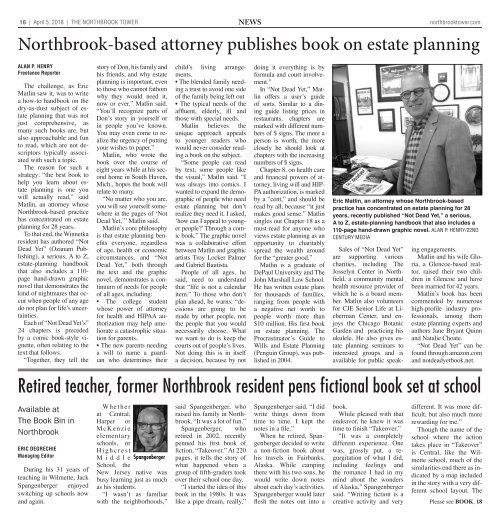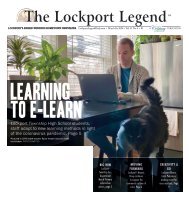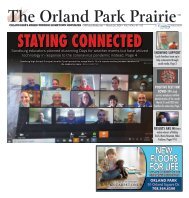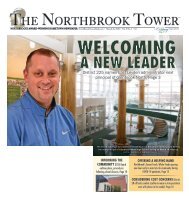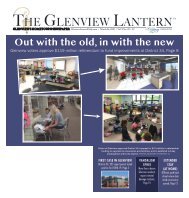NT_040518
The Northbrook Tower 040518
The Northbrook Tower 040518
Create successful ePaper yourself
Turn your PDF publications into a flip-book with our unique Google optimized e-Paper software.
16 | April 5, 2018 | The Northbrook tower news<br />
northbrooktower.com<br />
Northbrook-based attorney publishes book on estate planning<br />
Alan P. Henry<br />
Freelance Reporter<br />
The challenge, as Eric<br />
Matlin saw it, was to write<br />
a how-to handbook on the<br />
dry-as-dust subject of estate<br />
planning that was not<br />
just comprehensive, as<br />
many such books are, but<br />
also approachable and fun<br />
to read, which are not descriptors<br />
typically associated<br />
with such a topic.<br />
The reason for such a<br />
strategy: “the best book to<br />
help you learn about estate<br />
planning is one you<br />
will actually read,” said<br />
Matlin, an attorney whose<br />
Northbrook-based practice<br />
has concentrated on estate<br />
planning for 28 years.<br />
To that end, the Winnetka<br />
resident has authored “Not<br />
Dead Yet” (Ozanam Publishing),<br />
a serious, A to Z,<br />
estate-planning handbook<br />
that also includes a 110-<br />
page hand-drawn graphic<br />
novel that demonstrates the<br />
kind of nightmares that occur<br />
when people of any age<br />
do not plan for life’s uncertainties.<br />
Each of “Not Dead Yet’s”<br />
24 chapters is preceded<br />
by a comic book-style vignette,<br />
often relating to the<br />
text that follows.<br />
“Together, they tell the<br />
story of Don, his family and<br />
his friends, and why estate<br />
planning is important, even<br />
to those who cannot fathom<br />
why they would need it,<br />
now or ever,” Matlin said.<br />
“You’ll recognize parts of<br />
Don’s story in yourself or<br />
in people you’ve known.<br />
You may even come to realize<br />
the urgency of putting<br />
your wishes to paper.”<br />
Matlin, who wrote the<br />
book over the course of<br />
eight years while at his second<br />
home in South Haven,<br />
Mich., hopes the book will<br />
relate to many.<br />
“No matter who you are,<br />
you will see yourself somewhere<br />
in the pages of ‘Not<br />
Dead Yet,’” Matlin said.<br />
Matlin’s core philosophy<br />
is that estate planning benefits<br />
everyone, regardless<br />
of age, health or economic<br />
circumstances, and “Not<br />
Dead Yet,” both through<br />
the text and the graphic<br />
novel, demonstrates a continuum<br />
of needs for people<br />
of all ages, including:<br />
• The college student<br />
whose power of attorney<br />
for health and HIPAA authorization<br />
may help ameliorate<br />
a catastrophic situation<br />
for parents.<br />
• The new parents needing<br />
a will to name a guardian<br />
who determines their<br />
child’s living arrangements.<br />
• The blended family needing<br />
a trust to avoid one side<br />
of the family being left out<br />
• The typical needs of the<br />
affluent, elderly, ill and<br />
those with special needs.<br />
Matlin believes the<br />
unique approach appeals<br />
to younger readers who<br />
would never consider reading<br />
a book on the subject.<br />
“Some people can read<br />
by text, some people like<br />
the visual,” Matlin said. “I<br />
was always into comics. I<br />
wanted to expand the demographic<br />
of people who need<br />
estate planning but don’t<br />
realize they need it. I asked,<br />
‘how can I appeal to younger<br />
people?’ Through a comic<br />
book.” The graphic novel<br />
was a collaborative effort<br />
between Matlin and graphic<br />
artists Troy Locker Palmer<br />
and Gabriel Bautista.<br />
People of all ages, he<br />
said, need to understand<br />
that “life is not a calendar<br />
item.” To those who don’t<br />
plan ahead, he warns: “decisions<br />
are going to be<br />
made by other people, not<br />
the people that you would<br />
necessarily choose. What<br />
we want to do is keep the<br />
courts out of people’s lives.<br />
Not doing this is in itself<br />
a decision, because by not<br />
doing it everything is by<br />
formula and court involvement.”<br />
In “Not Dead Yet,” Matlin<br />
offers a user’s guide<br />
of sorts. Similar to a dining<br />
guide listing prices in<br />
restaurants, chapters are<br />
marked with different numbers<br />
of $ signs. The more a<br />
person is worth, the more<br />
closely he should look at<br />
chapters with the increasing<br />
numbers of $ signs.<br />
Chapter 8, on health care<br />
and financial powers of attorney,<br />
living will and HIP-<br />
PA authorization, is marked<br />
by a “cent,” and should be<br />
read by all, because “it just<br />
makes good sense.” Matlin<br />
singles out Chapter 18 as a<br />
must-read for anyone who<br />
views estate planning as an<br />
opportunity to charitably<br />
spread the wealth around<br />
for the “greater good.”<br />
Matlin is a graduate of<br />
DePaul University and The<br />
John Marshall Law School.<br />
He has written estate plans<br />
for thousands of families,<br />
ranging from people with<br />
a negative net worth to<br />
people worth more than<br />
$10 million. His first book<br />
on estate planning, The<br />
Procrastinator’s Guide to<br />
Wills and Estate Planning<br />
(Penguin Group), was published<br />
in 2004.<br />
Eric Matlin, an attorney whose Northbrook-based<br />
practice has concentrated on estate planning for 28<br />
years, recently published “Not Dead Yet,” a serious,<br />
A to Z, estate-planning handbook that also includes a<br />
110-page hand-drawn graphic novel. Alan P. Henry/22nd<br />
Century Media<br />
Sales of “Not Dead Yet”<br />
are supporting various<br />
charities, including The<br />
Josselyn Center in Northfield,<br />
a community mental<br />
health resource provider of<br />
which he is a board member.<br />
Matlin also volunteers<br />
for CJE Senior Life at Lieberman<br />
Center, and enjoys<br />
the Chicago Botanic<br />
Garden and practicing his<br />
ukulele. He also gives estate<br />
planning seminars to<br />
interested groups and is<br />
available for public speaking<br />
engagements.<br />
Matlin and his wife Gloria,<br />
a Glencoe-based realtor,<br />
raised their two children<br />
in Glencoe and have<br />
been married for 42 years.<br />
Matlin’s book has been<br />
commended by numerous<br />
high-profile industry professionals,<br />
among them<br />
estate planning experts and<br />
authors Jane Bryant Quinn<br />
and Natalie Choate.<br />
“Not Dead Yet” can be<br />
found through amazon.com<br />
and notdeadyetbook.net.<br />
Retired teacher, former Northbrook resident pens fictional book set at school<br />
Available at<br />
The Book Bin in<br />
Northbrook<br />
Eric DeGrechie<br />
Managing Editor<br />
During his 31 years of<br />
teaching in Wilmette, Jack<br />
Spangenberger enjoyed<br />
switching up schools now<br />
and again.<br />
Whether<br />
at Central,<br />
Harper or<br />
McKenzie<br />
elementary<br />
schools, or<br />
Highcrest<br />
Middle Spangenberger<br />
School, the<br />
New Jersey native was<br />
busy learning just as much<br />
as his students.<br />
“I wasn’t as familiar<br />
with the neighborhoods,”<br />
said Spangenberger, who<br />
raised his family in Northbrook.<br />
“It was a lot of fun.”<br />
Spangenberger, who<br />
retired in 2002, recently<br />
penned his first book of<br />
fiction, “Takeover.” At 220<br />
pages, it tells the story of<br />
what happened when a<br />
group of fifth-graders took<br />
over their school one day.<br />
“I started the idea of this<br />
book in the 1980s. It was<br />
like a pipe dream, really,”<br />
Spangenberger said. “I did<br />
write things down from<br />
time to time. I kept the<br />
notes in a file.”<br />
When he retired, Spangenberger<br />
decided to write<br />
a non-fiction book about<br />
his travels in Fairbanks,<br />
Alaska. While camping<br />
there with his two sons, he<br />
would write down notes<br />
about each day’s activities.<br />
Spangenberger would later<br />
flesh the notes out into a<br />
book.<br />
While pleased with that<br />
endeavor, he knew it was<br />
time to finish “Takeover.”<br />
“It was a completely<br />
different experience. One<br />
was, grossly put, a regurgitation<br />
of what I did,<br />
including feelings and<br />
the romance I had in my<br />
mind about the wonders<br />
of Alaska,” Spangenberger<br />
said. “Writing fiction is a<br />
creative activity and very<br />
different. It was more difficult,<br />
but also much more<br />
rewarding for me.”<br />
Though the name of the<br />
school where the action<br />
takes place in “Takeover”<br />
is Central, like the Wilmette<br />
school, much of the<br />
similarities end there as indicated<br />
by a map included<br />
in the story with a very different<br />
school layout. The<br />
Please see book, 18


